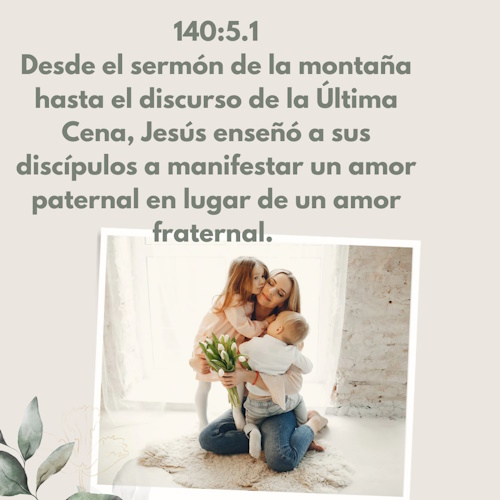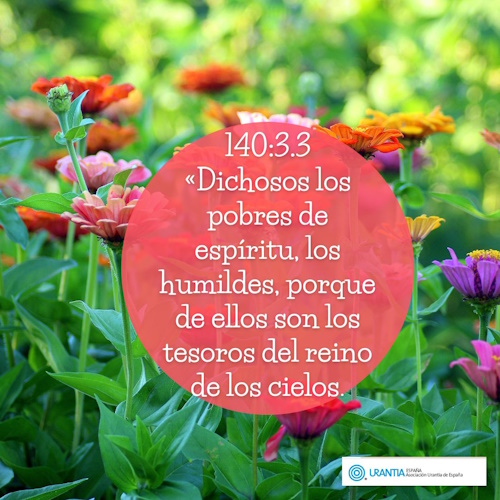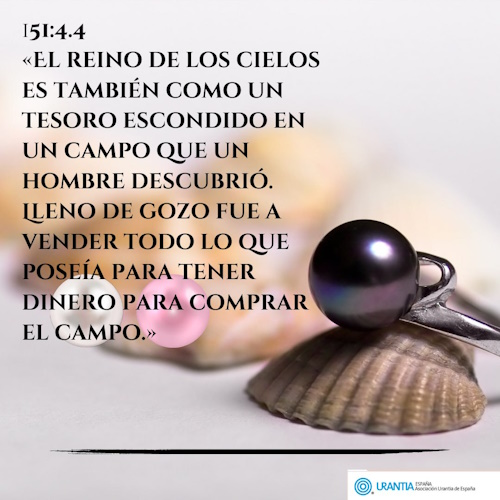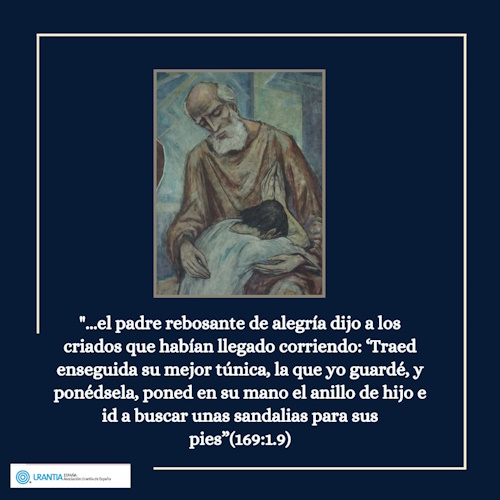© 2023 María José Sánchez Santamaría
© 2023 Urantia Association of Spain
| Luz y Vida — April 2023 — Newsletter | Luz y Vida — April 2023 — Index | Urantia Questionnaire: Omar Delgado |

Once again, dear readers of this newsletter, we meet and reflect together on The Urantia Book and its amazing teachings. And once again we are approaching the celebrations of Holy Week. A few days of vacation, holidays, with various processions through Spain, religious services, etc. In the Jewish solar calendar, the beautiful month of Nissan has now begun, the first of the year and, with it, spring. The beginnings are externalized and sprout, the winter mists are gone… It is a wonderful moment to renew ourselves inside.
That young man was dirty, alone and hungry. Very hungry. Such was his hunger that he felt his anguish overflowing in silent cries. She was crying because she was reminded of her deplorable situation and her heart was breaking. He would cry himself exhausted and fall asleep.
He, who had dreamed of traveling and touring the world! He who had lived like a prince and now lived like a beggar among pigs!
One morning, while he was feeding the pigs, he put a carob in his mouth. Victim of a hunger that drove him crazy, he ate another and another, until he felt satisfied. Shortly after, between sad retchings, he vomited everything.
With nostalgia welling up throughout his body, he remembered the patio with the lemon trees, the well with the vine, the pigeons on the roof, he closed his eyes and huddled in a corner.
This is how the days went by: he worked, slept, ate something, cried… Little by little he moved away from himself and no longer remembered who he really was. It became brutalized, became feral, and shrank more and more.
But one morning there was a curious and strange silence. One by one the pigs stopped grunting and snouting and swallowing and stared at him. They looked at this strange man, disheveled and with a sad silhouette. And with that silence her mind clicked, stopped. The young man began to think. It had been a while since she had, but the moment she could think, she realized something that hadn’t occurred to her before: I’m going back to my father’s house. It started up immediately. He left behind the stench, the boss’s insults, the hovel where he had lived those years. He was leaving for his home, for freedom, to be himself again.
Many, many times during his years of teaching, Jesus told and retold this story of the prodigal son. This parable and the story of the good Samaritan were his favorite means of teaching the love of the Father and the neighborliness of man. (UB 169:1.16)
This beautiful parable, that of the prodigal son, shows us that there is nothing more beautiful than making a pilgrimage towards oneself, walking towards what we are. Going deeper into oneself is the real revolution! But how many are the roads by which we get lost! That prodigal son is you and me. We squander the treasures that God gives us and look outside for what is within us, in our conscience. We are surrounded by “pigs” or “eating carobs” that life presents us with, and we modestly realize that we live far below what corresponds to us. How come I’m watching this deplorable TV show? What do I do in this job? Is this really all I can do with my partner? I’ll be back, we tell ourselves then. I will return to myself, on my way home, step by step.
Half of our lives we have spent running from here to there, traveling, studying, maintaining relationships… Half of our lives wasting time stumbling, spending our lives trying and learning, discovering things that are not fulfilling and finally arriving, by our own means to discover where the treasure was.
The young and thoughtful Jesus of Nazareth, with his perspicacity, was also discovering (as we do) where the key to everything was: inside.
And yet, as this man walked about Nazareth to and from his work, it was literally true—as concerned a vast universe—that “in him were hidden all the treasures of wisdom and knowledge.” (UB 128:7.2)
Jesus also knew that it was essential to know how to place oneself at the right point, in the humility of how small we are (in this immense and boundless universe), but it is also true that we can also discover the great possibilities that can open up to us below:

“Happy are the poor in spirit, the humble, for theirs are the treasures of the kingdom of heaven. (UB 140:3.3)
The young playboy returned home due to the experience of emptiness, knowing that he was nothing, which he had to go through. He had to go through the experience of enjoying the vanities of the world, knowing the pleasures of the senses, living outside of your body to get on his way to the real world. After a blow of life, after a void, after suffering and humbly seeing our limits and feeling loneliness, people, then, want to return to God. Without the void, we never return to meet God, the Father. It is logical: it is not difficult for anyone to part with a trifle when they find a treasure.

But this beautiful story of the prodigal son has many nuances. Parables were used by Jesus precisely for this reason, because they are treasures of multiple spiritual teachings.
We can also identify in this story with the character of the father, the key figure that Jesus wanted us to understand. He tells us about a father who gives us the freedom to leave and who even allows us to get lost; a father who never tires of waiting for us and is deeply happy when we return to him.
Jesus himself, as the Father creator of a vast host of beings, also acts as a father, like that father in the parable. Patient, generous and forgiving of our mistakes. He was a father and had to suffer as such due to the misguidance of Lucifer and his followers, some sons and daughters who denied their father and his teachings.
Another problem somewhat difficult of explanation in the constellation of Norlatiadek pertains to the reasons for permitting Lucifer, Satan, and the fallen princes to work mischief so long before being apprehended, interned, and adjudicated.
Parents, those who have borne and reared children, are better able to understand why Michael, a Creator-father, might be slow to condemn and destroy his own Sons. Jesus’ story of the prodigal son well illustrates how a loving father can long wait for the repentance of an erring child.
The very fact that an evil-doing creature can actually choose to do wrong—commit sin—establishes the fact of free-willness and fully justifies any length delay in the execution of justice provided the extended mercy might conduce to repentance and rehabilitation. (UB 54:4.1-3)
This parable, therefore, also shows us what Jesus was like: a magnificent father. He shows us how we can emulate him in that ideal of parental love.
From the Sermon on the Mount to the discourse of the Last Supper, Jesus taught his followers to manifest fatherly love rather than brotherly love. Brotherly love would love your neighbor as you love yourself, and that would be adequate fulfillment of the “golden rule.” But fatherly affection would require that you should love your fellow mortals as Jesus loves you. (UB 140:5.1)
Parental love is filled with joy to return good for evil, to respond to injustice by doing good. UB 140:5.24
This elevated manner of behavior surprises us, it goes against the current of what we observe many times, but that’s how God is; this is our creator, Miguel.

And after they had thus met, the son looked up into his father’s tearful face and said: ‘Father, I have sinned against heaven and in your sight; I am no more worthy to be called a son’—but the lad did not find opportunity to complete his confession because the overjoyed father said to the servants who had by this time come running up: ‘Bring quickly his best robe, the one I have saved, and put it on him and put the son’s ring on his hand and fetch sandals for his feet.’ (UB 169:1.9)
The father leaves the past behind, lets him immerse himself in the present of the embrace. Let us therefore live in the present, in the embrace of this loving Father who always awaits us and loves us without measure. Let us return, then, already loaded with the experiences that have destroyed and built us, towards who is within us, who is always “watching in case we return”, who celebrates our return:
“And then, after the happy father had led the footsore and weary lad into the house, he called to his servants: ‘Bring on the fatted calf and kill it, and let us eat and make merry, for this my son was dead and is alive again; he was lost and is found.’ And they all gathered about the father to rejoice with him over the restoration of his son. (UB 169:1.10)
Let us embrace in the present by His arms. Let us return as prodigal children to our house. Let’s return to ourselves. That is the extraordinary lesson of The Urantia Book.
¶ References
| Luz y Vida — April 2023 — Newsletter | Luz y Vida — April 2023 — Index | Urantia Questionnaire: Omar Delgado |